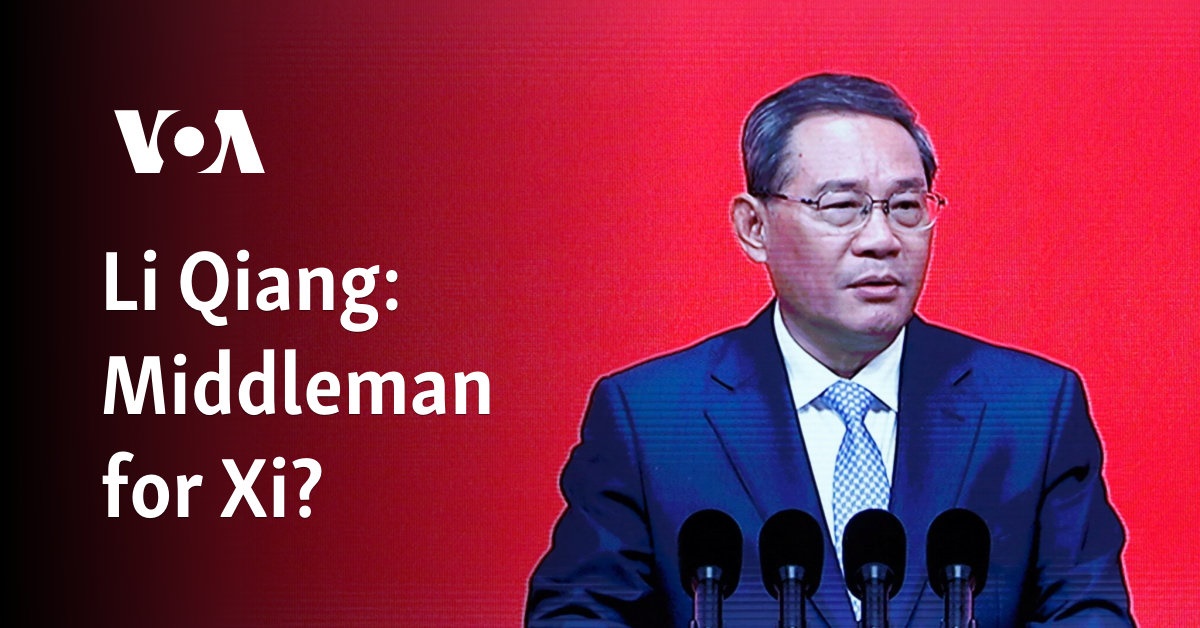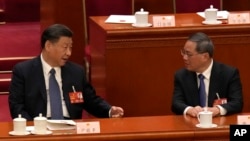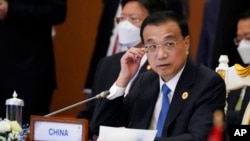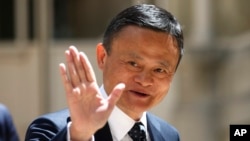Speculation about Premier Li Qiang’s future, role and status within China’s power structure has been rampant since his scheduled regular press conference last month was canceled for unknown reasons. This can be said to be the biggest news since Li Keqiang took office a year ago, a figure that is basically unknown to the outside world.
Analysts told VOA that to better understand Li Keqiang, it is important to understand his place in China’s leadership structure – which is highly centralized under the strict rule of Communist Party General Secretary Xi Jinping – and the two men’s shared past, which stretches back to twenty years ago.
Road to Prime Minister
Li was born in 1959 in a rural area of Zhejiang, a coastal province in China. His family has roots in rural Zhejiang, and after graduating from high school at the age of 17, Li started working as an industrial worker.
He comes from a very different background than his boss, Xi Jinping, whose father was one of China’s first generation of Communist Party leaders. His background also differs from that of his predecessor Li Keqiang, who studied at the prestigious Peking University and whose father was a local party official.
Li Qiang began his rise through the ranks of the Chinese Communist Party after studying at an agricultural college in his hometown. After graduating in 1982, Li never worked in a factory or in the countryside.
From 2000 to 2002, he served as Director of the Zhejiang Provincial Bureau of Commerce. In 2002, at the age of 43, he became the youngest municipal party committee secretary in his hometown of Wenzhou City, Zhejiang Province. Wenzhou is known as the capital of entrepreneurs.
In the same year, Xi Jinping was transferred from Fujian, another coastal province, to the post of Secretary of the Zhejiang Provincial Party Committee, directly leading Wenzhou and other municipalities directly under the Central Government.
It was during Xi Jinping’s tenure in Zhejiang in 2002 and until his trip to Shanghai in 2007 that the two had the opportunity to meet. From 2004 to 2005, Li Keqiang served as director of the General Office of the Zhejiang Provincial Party Committee, essentially serving as Xi Jinping’s chief of staff. His responsibilities soon expanded to include member of the Standing Committee of the Provincial Party Committee, deputy secretary of the Provincial Party Committee, director of the Provincial Political and Legal Affairs Committee, and governor of Zhejiang Province.
In 2016, Li was promoted to Secretary of the Jiangsu Provincial Party Committee, and a year later to Secretary of the Shanghai Municipal Party Committee. In March 2023, he was appointed Prime Minister.
“It’s fair to say that all of his subsequent promotions are attributed to Xi Jinping,” Xia Ming, a Chinese-born political science professor at City University of New York, said in a telephone interview with VOA.
Wenzhou model
“It is worth noting that Li Keqiang is closely associated with the so-called ‘Wenzhou model,’ which is similar to so-called liberal economics in the West,” Xia added.
Xia said the success of the “Wenzhou model” led by private entrepreneurs was due to the non-interference of local Communist Party officials at the time, in sharp contrast to the Communist Party’s heavy-handed tactics today.
“Now that Li has joined Xi Jinping’s cabinet, whatever model he adopts must succumb to Xi Jinping’s model,” Hu Ping told VOA. Hu Ping, a native of Sichuan Province in south-central China, earned a degree from Peking University in the 1980s , and later went into exile in the United States.Hu Ping Honorary Editor China Spring Magazine.
Eric Tsang, author Xi Jinping’s political thought, In a telephone interview with VOA from London, Tsang explained how he viewed the Xi Jinping model: “What Xi Jinping is trying to do is create a country, a nation, an ideology, a political party, a leader,” Tsang said.
Tsang added that unlike Li Keqiang, who received the position due to the support of party elders, Li Qiang was hand-picked by Xi Jinping and is expected to carry out Xi Jinping’s orders.
While the appointment of Li Qiang to replace Li Keqiang is seen as an attempt to consolidate the above model, there are signs that Li Qiang’s connections with the Chinese business community over his years of working in Zhejiang, Jiangsu and Shanghai may be used to help Xi Jinping solve some problems. The country’s economic challenges.
potential intermediary
economist It was reported in March last year that Li Qiang was involved in persuading Jack Ma, one of China’s most famous businessmen, to return to China. Ma, like Li, a native of Zhejiang, has reportedly feuded with Xi over a crackdown on private business and Ma’s growing popularity at home and abroad. Jack Ma is said to be in self-exile in Japan.
The article stated that Li Keqiang “tried to reassure wealthy private entrepreneurs that although they should know their place, they are still valued by the party.”
Despite assurances from Jack Ma and private entrepreneurs, China’s economy still faces significant challenges, including declining foreign direct investment and capital outflows.
Li’s predecessor, Li Keqiang, was known for being outspoken about China’s economy and calling for a more domestic welfare-centered approach, in stark contrast to Xi Jinping’s expansionist model centered on state power.
In May 2020, Li Keqiang told reporters at a press conference of the National People’s Congress that more than 40% of China’s 1.4 billion people live on US$143 a month, a comment that was seen as an official line that “poverty has been eliminated nationwide.” condemnation. Under the leadership of Xi Jinping.
Li Keqiang has even developed an index to measure China’s economic growth, which is considered more reliable than local government data because it takes into account rail freight volumes, electricity consumption and loans issued by banks.
Li Qiang, who took over from Li Keqiang a year ago, is widely regarded as a close confidant of Xi Jinping and his main job is to do the bidding of the Chinese leader. Whether this includes other mediation efforts on behalf of Xi Jinping in China’s political and economic power struggle remains to be seen.
“To be a middleman or a power broker, you need to have some influence on both sides,” said Xia Ming of the City University of New York. Xia said that aside from his loyalty credentials, Li Keqiang is also under pressure to demonstrate his ability to look after the Chinese Communist Party’s purse strings.
Xia added that Mao Zedong’s old saying that “power comes from the barrel of a gun” has been revised. Money bags are also a key factor if you want to stay in power.
Follow us on Google news ,Twitter , and Join Whatsapp Group of thelocalreport.in
















